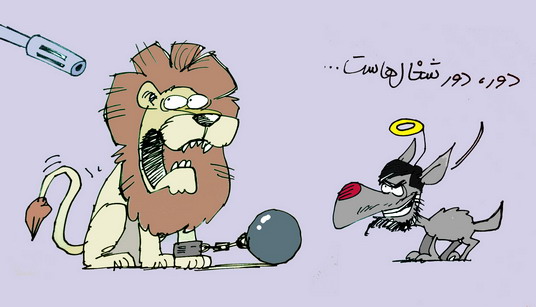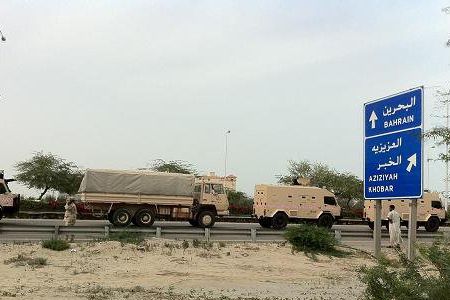Bahrain in Video and Pictures: The Security Forces Move Quickly
Minutes before the attack at Pearl Roundabout --- Morning Prayers:
From Tuesday --- police beating a man:
 Bahrain
Bahrain Minutes before the attack at Pearl Roundabout --- Morning Prayers:
From Tuesday --- police beating a man:
 Bahrain
Bahrain  2110 GMT: An update from Misurata, 210 km (130 miles) east of Tripoli....
2110 GMT: An update from Misurata, 210 km (130 miles) east of Tripoli....
Opposition fighters say they have repelled regime forces on the southern and western sides of the city, with a battle --- but "not a heavy one" --- continuing on the eastern side.
Libyan state television has appealed to the people of Misurata to support regime troops: "The armed forces are from you and for you. Avoid strife....This is a call for stability and security for everybody. Do not listen to provocation and avoid discord."
2000 GMT: Reuters summarises fierce fighting in Ajdabiya in east Libya, with "weary" government soldiers saying that they were meeting "renewed resistance" from the opposition.
"The fighting is fierce. His supply lines are stretched so he can't push on from Ajdabiya. We've got some surprises in store. We're going to fight on and we're going to win," said Mustafa Gheiriani, an opposition spokesman in Benghazi.
Reinforcements from Benghazi are said to be heading to Ajdabiya.
Witnesses describe a violent regime crackdown around the city.
Rouzbeh Parsi, a research fellow at the European Institute for Security Studies (EUISS), is interviewed by France 24 about the current political position for the opposition and the regime in Iran. He evaluates why the 2009 rising did not succeed in its objective --- "Iran is a much more nuanced political system...so it isn't just the Government and the opposition" as in Tunisia and Egypt --- and how the regime, unlike its Ben Ali and Mubarak counterparts, did not blink because "they were prepared for the challenge".
And now? "The opposition is likely to become more radical....Both sides are pushing each other to the brink, with the primary responsibility being on the side of the Government."
 France 24,
France 24,  Rouzbeh Parsi
Rouzbeh Parsi  “The whole thing is a sort of political and social [cartoon] activism to help the ‘green movement’ and the people opposing the ayatollahs,” Kowsar says. “We want to keep [Iranian citizens] enthusiastic and happy. They are having a hard time, so possibly this could encourage many people to look through this as a nonviolent disobedience and action.”
“The whole thing is a sort of political and social [cartoon] activism to help the ‘green movement’ and the people opposing the ayatollahs,” Kowsar says. “We want to keep [Iranian citizens] enthusiastic and happy. They are having a hard time, so possibly this could encourage many people to look through this as a nonviolent disobedience and action.”
 To tackle the deficit, the government must sharply curtail the $1.1 trillion it currently "spends" annually on exemptions and deductions in the tax code. To give that number some perspective: it roughly equals what America spends each year on discretionary programs --- including defense --- and is about 2/3 of the yearly deficit. If these “backdoor spending grants” for special interests are eliminated, the commission contends, marginal tax rates can be lowered to broaden and simplify the tax base while increasing government revenue. Controversially, much of this increased revenue would not be used to finance government spending, but would be dedicated solely to paying off America's debt.
To tackle the deficit, the government must sharply curtail the $1.1 trillion it currently "spends" annually on exemptions and deductions in the tax code. To give that number some perspective: it roughly equals what America spends each year on discretionary programs --- including defense --- and is about 2/3 of the yearly deficit. If these “backdoor spending grants” for special interests are eliminated, the commission contends, marginal tax rates can be lowered to broaden and simplify the tax base while increasing government revenue. Controversially, much of this increased revenue would not be used to finance government spending, but would be dedicated solely to paying off America's debt.
 1955 GMT: The House Arrests. This just in from Saham News, translated by Banooye Sabz:
1955 GMT: The House Arrests. This just in from Saham News, translated by Banooye Sabz:
A few hours ago, Mohammad Taghi Karroubi, Mehdi Karroubi's second son published a short note on his personal site indicating that a close family friend has visited with his parents.The following is an excerpt of the note on Mohammad Taghi Karroubi's site:
"A dear clergyman trusted both by the family and the ruling government contacted me today by phone stating that he had met with my mother and father last night in a friendly setting. This beloved person informed me that they are doing well, are in good health and peaceful."
Note the curiosity in the story: the clergyman did not meet the Karroubis in their residence, where they are supposedly under house arrest, but in "a friendly setting". (The same situation occurred last week with Mir Hossein Mousavi and Zahra Rahnavard when they met their daughters in a building "near their home".) That leaves open the question of the exact status of the Karroubis --- strict house arrest or detention? And it also leaves open the question of when the Karroubis will next be able to speak to someone.

1611 GMT: The situation at the nuclear plants is urgent, indeed. Reuters has this flash update:
"IAEA head says core damage at units 1-3 of Japan's quake-hit nuclear plant confirmed, situation very serious"
1510 GMT: The mayor of Ishinomaki, in Miyagi Prefecture in northeast Japan, says it is likely that 10,000 are missing from the town.
The International Atomic Energy Agency says #Japanese authorities are concerned over the condition of pools for spent nuclear fuel pools at the Fukushima No. 3 and No. 4 nuclear reactor complexes.
0945 GMT: The New York Times summarises the situation at the Fukushima nuclear plant:
The authorities announced that a second reactor unit at the stricken Fukushima Daiichi plant in northeastern Japan may have ruptured and appeared to be releasing radio steam.
Such were the radiation levels above the plant, moreover, that the Defense Force put off a highly unusual plan to dump water from military helicopters to lower temperatures in an overheating pool containing spent fuel rods, news reports said.
 Faraz Sanei, a researcher in Bahrain for Human Rights Watch, reports:
Faraz Sanei, a researcher in Bahrain for Human Rights Watch, reports:
I have spoken to two people in the Shia village of Sitra, south of Manama, who confirmed that security forces, both civilian and police, attacked the medical center there following clashes between anti-government protesters and security forces that began in Sitra at around 11 a.m. Both were at the hospital during the attack at about 4.45 p.m. As we spoke on the phone during calls earlier today I heard shots being fired. I just spoke to both witnesses for a second time and they said that security forces did not enter the center but fired rubber bullets and tear gas inside the hospital. People who had gathered outside to find out what's happening to their loved ones were forced to go inside.
 The Live Stream of the conference has finished. We will post the archived video as soon as it is available.
The Live Stream of the conference has finished. We will post the archived video as soon as it is available.
The National Iranian American Council in Washington is hosting a one-day conference, "Answering the Iranian People's Call for Human Rights". The morning session, beginnng 8:45 a.m. local time (1345 GMT), will feature addresses by Suzanne Nossel, the US Deputy Assistant Secretary of State for International Organizations; Jonas Hafström, Sweden's Ambassador to the United States; Representative Keith Ellison; and Nazila Fathi, the New York Times correspondent in Tehran who was forced to leave soon after the June 2009 Presidential election.
In the afternoon, there will be a panel discussion on "The Human Rights Crisis and Iran’s Democracy Movement" with academic and author Nader Hashemi, analyst Alireza Nader, and Sarah Leah Whitson, the Middle East and North Africa Director of Human Rights Watch.
The Live Stream will began at 1345 GMT.
 The Saudi intervention, however small, is therefore a major step backward for the region. It represents a major slap in the face to the United States, a defeat for the liberal Shiite and Sunni elements in Bahrain, and ultimately a catastrophe for the entire Khalifa family, both the liberal and conservative wings, who may have just surrendered their power to the giant next door.
The Saudi intervention, however small, is therefore a major step backward for the region. It represents a major slap in the face to the United States, a defeat for the liberal Shiite and Sunni elements in Bahrain, and ultimately a catastrophe for the entire Khalifa family, both the liberal and conservative wings, who may have just surrendered their power to the giant next door.
Ultimately, this may also be a defeat for Saudi Arabia as well. The Saudis have long tried to avoid overt interventions in their neighbors' affairs. They intervened once during the 1994 upheavals in Bahrain and in the past two years have been active on the Yemeni border -- but under King Abdullah they have tried to arbitrate, rather than dominate, events on the Arabian Peninsula. Their decision to intervene directly in Bahrain's affairs suggests a weakness in the Saudi leadership and Riyadh's surrender to the more conservative elements in the country.